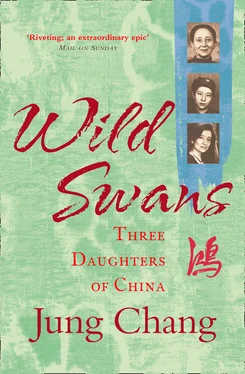A short time later, my grandmother realized she was pregnant. On the seventeenth day of the third moon, in spring 1931, she gave birth to a baby girl—my mother. She wrote to General Xue to let him know, and he wrote back telling her to call the girl Bao Qin and to bring her to Lulong as soon as they were strong enough to travel.
My grandmother was ecstatic at having a child. Now, she felt, her life had a purpose, and she poured all her love and energy into my mother. A happy year passed. General Xue wrote many times asking her to come to Lulong, but each time she managed to stall him. Then, one day in the middle of summer 1932, a telegram arrived saying that General Xue was seriously ill and ordering her to bring their daughter to see him at once. The tone made it clear that this time she should not refuse.
Lulong was about 200 miles away, and for my grandmother, who had never travelled, the journey was a major undertaking. It was also extremely difficult to travel with bound feet; it was almost impossible to carry luggage, especially with a young child in one’s arms. My grandmother decided to take her fourteen-year-old sister, Yulan, whom she called ‘Lan’, with her.
The journey was an adventure. The area had been convulsed yet again. In September 1931 Japan, which had been steadily expanding its power in the area, had launched a full-scale invasion of Manchuria, and Japanese troops had occupied Yixian on 6 January 1932. Two months later the Japanese proclaimed the founding of a new state, which they named Manchukuo (‘Manchu Country’), covering most of northeast China (an area the size of France and Germany combined). The Japanese claimed that Manchukuo was independent, but in fact it was a puppet of Tokyo. As its head they installed Pu Yi, who as a child had been the last emperor of China. At first he was called Chief Executive; later, in 1934, he was made emperor of Manchukuo. All this meant little to my grandmother, who had had very little contact with the outside world. The general population were fatalistic about who their rulers were, since they had no choice in the matter. For many, Pu Yi was the natural ruler, a Manchu emperor and proper Son of Heaven. Twenty years after the republican revolution there was still no unified nation to replace the rule of the emperor, nor, in Manchuria, did the people have much concept of being citizens of something called ‘China’.
One hot summer’s day in 1932 my grandmother, her sister, and my mother took the train south from Yixian, passing out of Manchuria at the town of Shanhaiguan, where the Great Wall sweeps down from the mountains to the sea. As the train chugged along the coastal plain, they could see the landscape changing: instead of the bare, brown-yellow soil of the plains of Manchuria, here the earth was darker and the vegetation denser, almost lush compared with the northeast. Soon after it passed the Great Wall, the train turned inland, and about an hour later it stopped at a town called Changli where they disembarked at a green-roofed building which looked like a railway station in Siberia.
My grandmother hired a horse-drawn cart and drove north along a bumpy, dusty road to General Xue’s mansion, which lay about twenty miles away, just outside the wall of a small town called Yanheying, which had once been a major military camp frequently visited by the Manchu emperors and their court. Hence the road had acquired the grand name of ‘the Imperial Way’. It was lined with poplars, their light green leaves shimmering in the sunlight. Beyond them were orchards of peach trees, which flourished in the sandy soil. But my grandmother scarcely enjoyed the scenery, as she was covered in dust and jolted badly by the rough road. Above all, she was worrying about what would greet her at the other end.
When she first saw the mansion, she was overwhelmed by its grandeur. The immense front gate was guarded by armed men, who stood stiffly at attention beside enormous statues of reclining lions. There was a row of eight stone statues for tying up horses: four were of elephants, and four of monkeys. These two animals were chosen for their lucky sounds: in Chinese the words ‘elephant’ and ‘high office’ have the same sound ( xiang ), as do ‘monkey’ and ‘aristocracy’ ( bou ).
As the cart passed through the outer gate into an inner yard my grandmother could see only a huge blank wall facing her; then, off to one side, she saw a second gate. This was a classic Chinese structure, a concealing wall so that strangers could not see into one’s property, also making it impossible for assailants to shoot or charge directly through the front gate.
The moment they passed through the inner gate, a servant materialized at my grandmother’s side and peremptorily took her child away. Another servant led my grandmother up the steps of the house and showed her into the sitting room of General Xue’s wife.
As soon as she entered the room, my grandmother went down on her knees and kowtowed, saying, ‘I greet you, my mistress’, as etiquette demanded. My grandmother’s sister was not allowed into the room, but had to stand outside like a servant. This was nothing personal: the relatives of a concubine were not treated as part of the family. After my grandmother had kowtowed for a suitable length of time, the general’s wife told her she could get up, using a form of address which immediately established my grandmother’s place in the hierarchy of the household as a mere submistress, closer to a higher form of servant than to a wife.
The general’s wife told her to sit down. My grandmother had to make a split-second decision. In a traditional Chinese household, where one sits automatically reflects one’s status. General Xue’s wife was sitting at the north end of the room, as befitted a person in her position. Next to her, separated by a side table, was another chair, also facing south: this was the general’s seat. Down each side of the room was a row of chairs for people of different status. My grandmother shuffled backwards and sat on one of the chairs nearest the door, to show humility. The wife then asked her to come forward—just a little. She had to show some generosity.
When my grandmother was seated, the wife told her that from now on her daughter would be brought up as her (the wife’s) own daughter and would call her, not my grandmother, ‘Mama’; my grandmother was to treat the child as the young mistress of the house, and was to behave accordingly.
A maid was summoned to lead my grandmother away. She felt her heart was breaking, but she forced back her sobs, only letting herself go when she reached her room. Her eyes were still red when she was taken to meet General Xue’s number-two concubine, his favourite, who ran the household. She was pretty, with a delicate face, and to my grandmother’s surprise she was quite sympathetic, but my grandmother restrained herself from having a good cry with her. In this strange new environment, she felt intuitively that the best policy was caution.
Later that day she was taken to see her ‘husband’. She was allowed to take my mother with her. The general was lying on a kang , the type of bed used all over North China, a large, flat, rectangular surface about two and a half feet high heated from underneath by a brick stove. A pair of concubines or maids were kneeling round the prostrate general, massaging his legs and stomach. General Xue’s eyes were closed, and he looked terribly sallow. My grandmother leaned over the edge of the bed, calling to him softly. He opened his eyes and managed a kind of a half-smile. My grandmother put my mother on the bed and said: ‘This is Bao Qin.’ With what seemed a great effort, General Xue feebly stroked my mother’s head and said, ‘Bao Qin takes after you; she is very pretty.’ Then he closed his eyes.
Читать дальше












